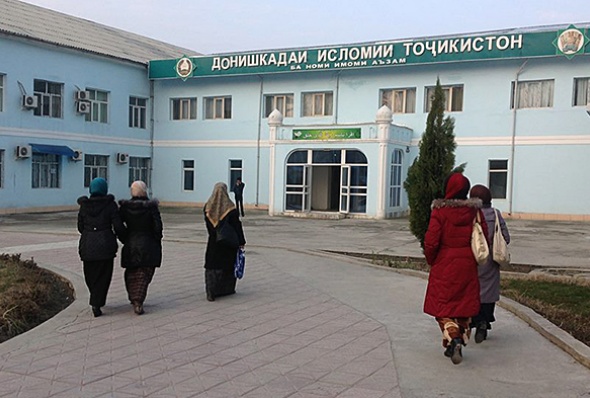The Tajik Government’s Committee on Religious Affairs will soon organize refresher training courses for imam-khatibs of republic mosques to be able to identify the followers of no Hanafi school amongst parishioners, i.e. to recognize “extremists or terrorists”. Hussein Shokirov, the Head of the Committee on Religious Affairs, said that to “AsiaPlus”. According to him, within the framework of these courses the representatives of the governmental religious organizations of the Islamic Center of Tajikistan will introduce imam-khatibs with the behaviour of the so-called “potential extremists and terrorists” at prayer. It should be noted that according to Islam, madhhab is a school of Sharia law, and there are four widespread known conventional Sunni madhhab in the Islamic world – Hanafi, Shafi’i, Maliki and Hanbali, each of which is followed by hundreds of millions of Muslims.
Thus, the Tajik authorities have carried the followers of different madhhabs to extremists or terrorists. It should be reminded that on 07 August 2015, Zikrullo Saidzoda, the representative of the Ministry of Internal Affairs of Tajikistan, before a Friday prayer at the Central Mosque in Dushanbe stated: “Anyone whose actions does not meet the requirements of Hanafi, will be questioned”. The facts of persecution on the grounds of belonging to a different madhhab has long been recorded in Tajikistan, but in recent years the Tajik authorities have apparently decided to reinforce the repressions of “dissidents”.
The observers note that in recent years in the country the cases of discrimination against the men wearing beards and the women wearing hijabs have increased: the Muslims who started to meet the requirements of their religion came immediately into the view of the law enforcement agencies and their families were under the supervision of the security forces. On 19 January this year, Bahrom Sharifzoda, the head of Internal Affairs of the Khatlon region, said: “In 2015 on the territory of the region the work of 162 sales outlets, selling satrs (hijabs) has been discontinued, 1773 women and girls, who previously wore hijabs refused them and the beards of 12,818 citizens were adjusted”.
The Tajik authorities are using the charges of extremism and terrorism as the main reason for the persecution of the practicing Muslims. On 25 January 2016, Ramazon Rahimzoda, the head of the Interior Minister of Tajikistan, at the press-conference said: “In 2015 international investigations were launched against 903 citizens for the links with terrorist and extremist organizations and 247 people were prosecuted for involvement in terrorist and extremist organizations”. It is noteworthy that not all the declared wanted Tajik citizens are the followers of any Islamic movements or organizations. A significant part of Tajiks outlawed for the mere adherence to their religion or because of a long absence from the country due to economic migration. The rejection of perjury against Muslims which often security forces demand from the citizens to fabricate criminal cases against believers has also become one of the reason for criminal prosecution in Tajikistan.
The experts believe that the increased pressure on believers by the authorities of Tajikistan is aimed at preventing the development of Islam in the country, and primarily due to the rapidly growing number of practicing Muslims in Central Asia in general and Tajikistan in particular.
Umar Farsiy

